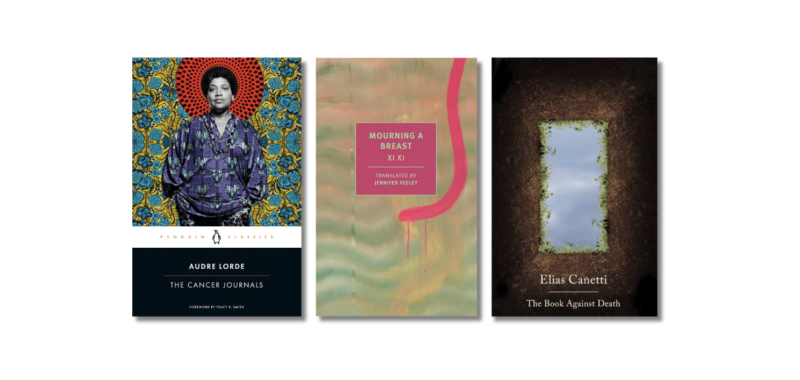It was the best of times, it was the worst of times: this year, my debut book was published, but I also contracted thyroid cancer and a number of autoimmune ailments, which ranged from aggravating to genuinely alarming. Suddenly, my life was an exercise in managing my body, just as much a bureaucratic ordeal as an anatomical one. I was lucky—I had good healthcare, an understanding boss, and a curable kind of early-stage cancer—but that didn’t prevent me from feeling frayed and fatigued and enormously sorry for myself. On the bright side, I had a lot of time for books, since I was forever atrophying in one waiting room or another.
Beyond the usual suspects—Ivan Ilyich, Hans Castorp—literature is populated by mostly healthy people. Still, after strenuous searching, I compiled a sort of private canon that could explain me to myself.

 First, the fiction. After my thyroid was removed, I lay drugged in my hospital bed reading Mourning a Breast, Hong Kong writer Xi Xi’s autobiographical novel about her mastectomy. Later, I was stunned by Katherine Anne Porter‘s Pale Horse, Pale Rider, probably the best piece of fiction about sickness ever written, and Garth Greenwell’s mesmerizing new novel, Small Rain. I also liked Infinite Life, a short tragi-comic play by Annie Baker about a new-age spa for people (inevitably, mostly women) with range of diseases, some of them indefinable and chronic, some of them desperate and acute.
First, the fiction. After my thyroid was removed, I lay drugged in my hospital bed reading Mourning a Breast, Hong Kong writer Xi Xi’s autobiographical novel about her mastectomy. Later, I was stunned by Katherine Anne Porter‘s Pale Horse, Pale Rider, probably the best piece of fiction about sickness ever written, and Garth Greenwell’s mesmerizing new novel, Small Rain. I also liked Infinite Life, a short tragi-comic play by Annie Baker about a new-age spa for people (inevitably, mostly women) with range of diseases, some of them indefinable and chronic, some of them desperate and acute. 
 As for non-fiction: I read The Cancer Diaries, Audre Lorde’s memoirs of her struggle with breast cancer; Intoxicated by my Illness, literary critic Anatole Broyard’s witty meditations on his prostate cancer; and especially In the Land of Pain, the nineteenth-century French novelist Alphonse Daudet’s reflections on the syphilis that ultimately killed him.
As for non-fiction: I read The Cancer Diaries, Audre Lorde’s memoirs of her struggle with breast cancer; Intoxicated by my Illness, literary critic Anatole Broyard’s witty meditations on his prostate cancer; and especially In the Land of Pain, the nineteenth-century French novelist Alphonse Daudet’s reflections on the syphilis that ultimately killed him.
 I read a lot of books for work, but I try to ensure that I’m always reading one or two solely for pleasure. Rarely but sometimes, however, a book I review will give rise to an obsession that takes over my personal reading life. Without a doubt, the highlight of my year was reviewing The Book Against Death, discovering Elias Canetti, and devouring everything of his I could get my hands on, from his weird and grotesque novel to his delightful monograph about Kafka. Most engrossing of all are his three volumes of memoirs, during which he befriends or offends most of the major figures in 20th century German-language letters.
I read a lot of books for work, but I try to ensure that I’m always reading one or two solely for pleasure. Rarely but sometimes, however, a book I review will give rise to an obsession that takes over my personal reading life. Without a doubt, the highlight of my year was reviewing The Book Against Death, discovering Elias Canetti, and devouring everything of his I could get my hands on, from his weird and grotesque novel to his delightful monograph about Kafka. Most engrossing of all are his three volumes of memoirs, during which he befriends or offends most of the major figures in 20th century German-language letters.

 And now for a barrage of miscellaneous titles that I loved but cannot fit under any of the other headings: Lesser Ruins by Mark Haber; A Day in the Life of Abed Salama by Nathan Thrall; All Our Yesterdays by Natalia Ginzburg; Literature and the Gods by Roberto Calasso; Mild Vertigo by Mieko Kanai; Season of Migration to the North by Tayeb Salih; Lives of Girls and Women by Alice Munro (no matter how bad a person she was or wasn’t, this book is luminous); Conundrum by Jan Morris; and Bitter Water Opera by Nicolette Polek.
And now for a barrage of miscellaneous titles that I loved but cannot fit under any of the other headings: Lesser Ruins by Mark Haber; A Day in the Life of Abed Salama by Nathan Thrall; All Our Yesterdays by Natalia Ginzburg; Literature and the Gods by Roberto Calasso; Mild Vertigo by Mieko Kanai; Season of Migration to the North by Tayeb Salih; Lives of Girls and Women by Alice Munro (no matter how bad a person she was or wasn’t, this book is luminous); Conundrum by Jan Morris; and Bitter Water Opera by Nicolette Polek.

